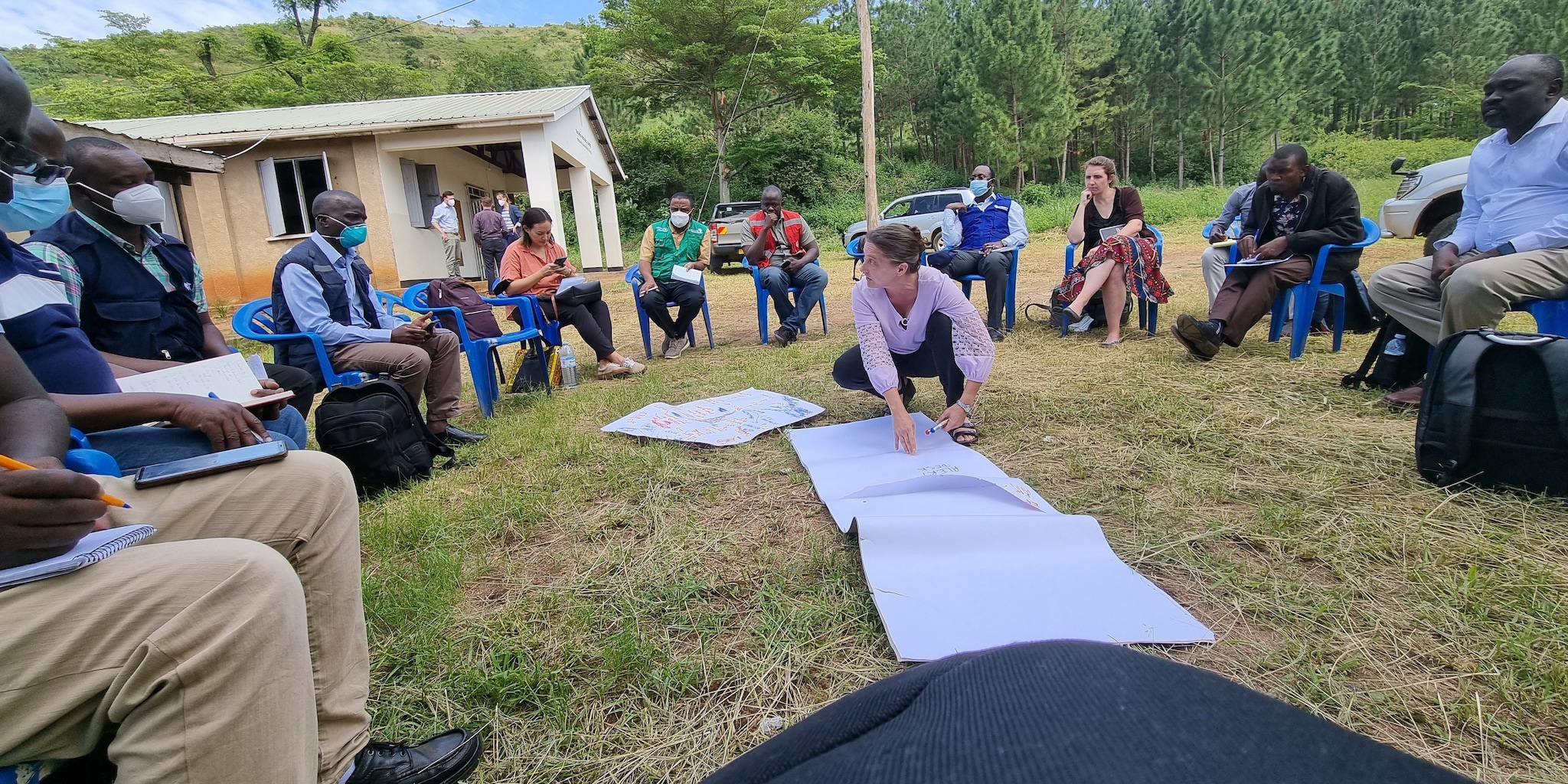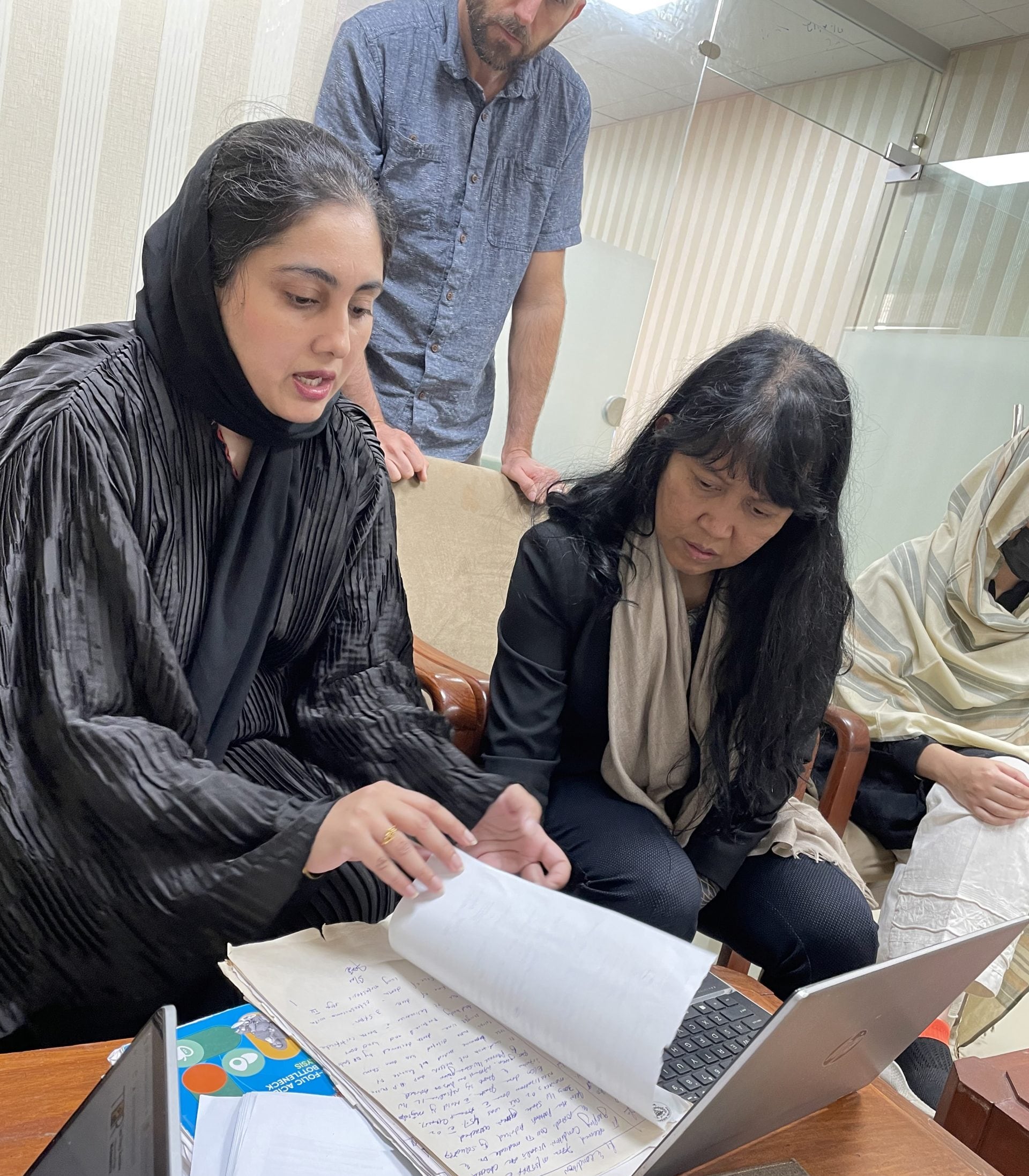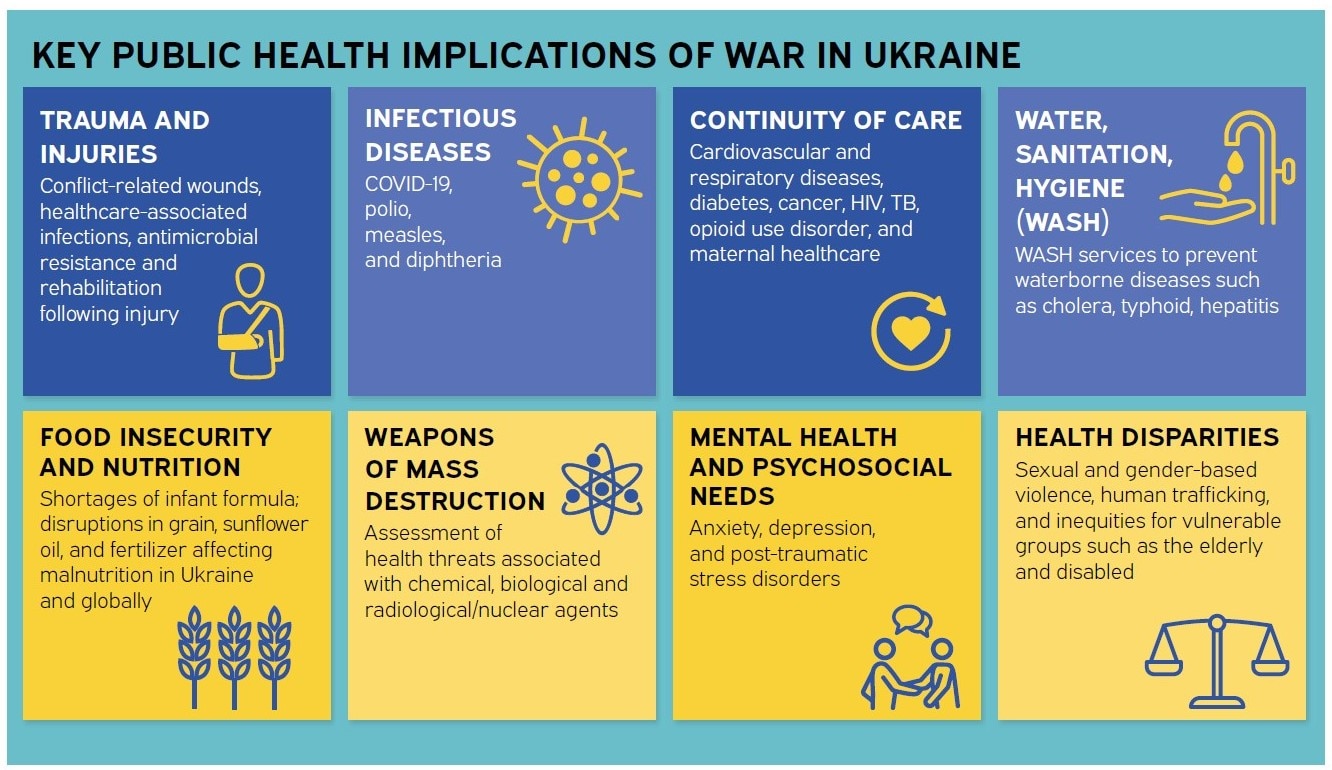Working Together to Achieve Improved Emergency Response Around the World
February 28, 2023

Dr. Amy Boore, Division of Global Health Protection Program Director, CDC Uganda (center) helps coordinate surveillance activities with partners in Mubende District, Uganda in the first week of the Ebola response to gather critical surveillance data and create a unified approach. Photo: CDC Uganda
New and ongoing global public health emergencies in 2022 continue to demonstrate the vital need for countries to be better prepared to respond to emergencies quickly and effectively. CDC partners internationally with ministries of health, U.S. government agencies, United Nations partners, and others to build emergency preparedness and response capacity. Activities include training responders, enhancing surveillance and lab systems, and supporting emergency operations centers to coordinate responses. CDC’s assistance allows more support on the ground, better technology, and improved coordination. As a result, countries like Uganda, Cameroon, Ukraine, and Pakistan were able to respond to disease outbreaks rapidly and effectively address complex health needs after natural disasters and humanitarian emergencies.
On September 20, 2022, the Ugandan Ministry of Health (MOH) confirmed an outbreak of Ebola (Sudan virus) in the country. CDC’s long-term relationship with Ugandan MOH and other U.S. agencies in Uganda to build emergency response capacity meant CDC was a trusted advisor and partner during the Ebola outbreak. In addition, CDC set up an incident command system to coordinate U.S. Government (USG) response support activities and partnered with other U.S. agencies within the U.S. Embassy.
CDC provided support in surveillance, epidemiology, laboratory, communication, and ecological investigations to help understand the relationship between exposure to the virus and the effect on a population. One significant impact was the work that CDC led with Uganda’s equivalent of the Field Epidemiology Training Program (FETP), which trains disease detectives to provide real-time information and data to inform response work. Ugandan country leadership called on FETP graduates and fellows, who were the first in the field, to perform Ebola case investigations. FETP teams worked long hours and helped save lives by gathering information, developing an Ebola transmission diagram, and making a roadmap to show partners where to focus resources to control the outbreak. CDC Uganda’s Division of Global Health Protection Program Director Dr. Amy Boore said, “FETP was pivotal in controlling and stopping this outbreak and was a key U.S. Government asset”. In fact, the Ugandan MOH is funding and expanding FETP because it sees it as the gold standard field training program to develop knowledgeable and capable leaders in public health.
On January 11, 2023, the Uganda MoH officially declared the Ebola outbreak over. CDC will continue to support the Ugandan Ministry of Health in surveillance, infection prevention and control, and response activities to help ensure rapid detection and response to any future Ebola cases or other disease outbreaks.
A Public Health Emergency Operations Center (PHEOC) serves as a hub for coordinating the preparation and response related to public health emergencies. PHEOCs enable coordination of resources and capacity building to respond to emergencies. CDC has helped establish PHEOCs globally to provide a quicker and more effective public health emergency response.
Cameroon’s PHEOC is effective in Africa based on its functionality, because it can be activated within six hours to respond to disease outbreaks or other emergencies. CDC trains responders from Ministry of Health and other ministries to handle public health work. CDC’s technical assistance and training in close collaboration with the Defense Threat Reduction Agency (DTRA) helps ensure Cameroon is ready for an emergency response at all times.
As a result, the country’s PHEOC initiated improved surveillance and response tools during outbreaks of COVID-19 and cholera. The tools were also useful in investigating a surge in deaths of pregnant or postpartum people and/or their babies.
The PHEOC focused on enhancing personnel and workforce development capacity by working closely with Cameroon’s Field Epidemiology Training Program (FETP), a CDC-supported program. More than 1,200 residents completed three-month Frontline FETP training. Fourteen graduates completed the nine-month FETP-Intermediate training, and 54 Advanced FETP residents finished two years of training. All FETP graduates are actively engaged in Cameroon’s Emergency Operations Center (EOC) to respond to disease threats.
The PHEOC was critical in coordinating response to COVID-19, cholera, and other disease outbreaks. Next, CDC will partner with the Cameroon Ministry of Health to further improve the efficiency and effectiveness of the PHEOC by decentralizing it and creating multiple PHEOCs at the regional level.
Since February 2022, the Government of the Russian Federation has been attacking Ukrainian cities, causing widespread death, destruction of critical infrastructure, and the largest and most rapid displacement of people from their homes since World War II. In a matter of weeks, an estimated millions of people fled their homes to seek safety, either to other areas in Ukraine or neighboring countries.
To respond to the complex health needs within Ukraine and border countries, CDC quickly mobilized to support the humanitarian response efforts of the U.S. government, Ukraine Ministry of Health (MOH), regional partners, United Nations, and non-government organizations.
As the Ukrainian MOH and partners confront public health priorities, CDC is leveraging technical experts from across the agency to provide support through programmatic and scientific guidance. This includes activating a program-level emergency response incident management structure, providing training on complex humanitarian emergencies and post-disaster needs assessments, and navigating supply chain disruptions. Leading technical experts are also giving guidance on how to prioritize and adapt existing programs to tackle emerging health needs such as war-related injuries and associated antibiotic-resistant wound infections, acute diarrheal diseases, and disrupted care for chronic diseases.
Although the current humanitarian response is ongoing and evolving, planning is underway to determine how to rebuild key public health infrastructure, such as facilities, programs, and personnel. These efforts also include improving identified gaps and providing long-term safeguards in public health security.

CDC epidemiologist Endang Handzel works with Dr. Hana Yahya (Gallup, Pakistan) to assess death records and trends, including the examination of flood-related mortality. Photo: Dr. Sobhan Qadir/CDC Consultant
In September 2022, heavy rain during monsoon season led to severe flooding in 84 out of 124 districts in Pakistan. This flooding resulted in 1.3 million homes damaged and affected about 33 million people. Epidemiologists from CDC quickly deployed to the CDC Pakistan country office. During this swift response, CDC experts played an important role in engaging U.S. Government agencies, Ministry of National Health Services, Regulations & Coordination (M/o NHSR&C), and United Nations (UN) agencies to determine provincial and district-level health needs. For instance, CDC and M/o NHSR&C coordinated work to provide access to clean drinking water and sanitation for people in affected areas of Pakistan. These water, sanitation, and hygiene (WASH) services help prevent disease spread through unsanitary conditions, exposure to dirty water, and poor hygiene practices.
Additionally, CDC experts collaborated with local data experts to develop an emergency surveillance dashboard to monitor flood-related disease trends under the National Institute of Health Pakistan (NIH). Provincial-level public health staff learned how to accurately interpret the data and then identify and respond to disease trends in the flood-affected areas of Pakistan to save lives. In collaboration with the health sector coordination body, CDC staff are now analyzing the successes and challenges experienced during the Pakistan floods emergency response. Reflecting on lessons learned will improve emergency response efforts in the future.
Emergencies can happen at any time and anywhere. CDC remains committed to helping countries prepare for and mount an effective response against any future disease outbreak. Fragile health systems anywhere leave openings for disease to take root and spread, allowing local challenges to become global crises. In the face of this threat, CDC continues to leverage its resources and relationships, providing technical support for emergency preparedness and response to countries around the world.
